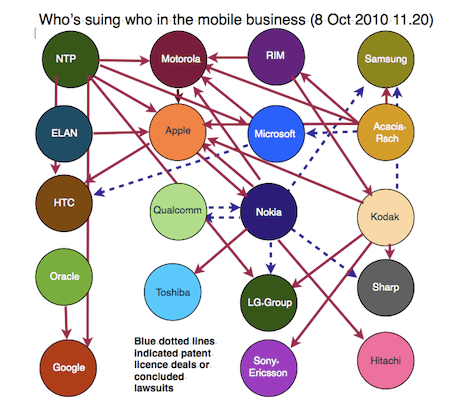Microsoft is launching legal action against Motorola over its line of Android-based smartphones, claiming the manufacturer infringes a number of its patents. The lawsuit is the latest in a series of patent infringement cases being fought in the increasingly-competitive mobile market.
Microsoft, the world's largest software company, claims that Motorola infringes nine of its patents in mobile phones running Google's Android operating system; specifically, email, contacts and calendar synchronisation, scheduling meetings and notifying applications of changes in signal and battery strength.
The increasingly-popular Android software is also at the heart of a legal battle between Oracle and Google, while Nokia is embroiled in a long-running legal battle against Apple, and Apple is separately suing manufacturer HTC. Manufacturers have become quick off the mark in launching legal action against rivals, owing to a dynamic smartphone market across continents.
In a recent interview with the Wall Street Journal, Microsoft chief executive Steve Ballmer suggested it was misleading to label Google's Android software as "free" in contrast to software produced by other companies, saying: "Android has a patent fee. It's not like Android's free. You do have to license patents."
He also revealed that HTC is paying a per-handset fee to Microsoft over patents.
The diagram above shows who is, or has been, suing who in the mobile industry: notably, Nokia is the most active litigator, with 6 companies targeted, compared to 2 incoming writs (from Apple and Qualcomm).
By contrast Microsoft looks like a newcomer - having only served 2 writs.
Google, intriguingly, only has 1 writ on its doorstep, from Oracle - but that pertains to Android. And so do all the lawsuits from Microsoft.
Some of the cases have been settled (we'll update the graphic as things change) but we thought for now that this would help you to see how things stand. Which, briefly, is like an explosion in a spear factory.
With that in mind, here's what Horacio Gutierrez, Microsoft's deputy general counsel in charge of intellectual property, said in a blog post about the Motorola suit: "As we all know, smartphones have become an integral part of people's daily lives and are used for a variety of tasks beyond making phone calls; from watching video and listening to music to staying in touch with family and friends.
"The Microsoft innovations at issue in this case help make smartphones 'smart.' Indeed, our patents relate to key features that users have come to expect from every smartphone. [...] That Microsoft has important patents in this area should not surprise anyone – we've spent over 30 years developing cutting-edge computer software."
Motorola said it would "vigorously defend itself" when challenged with patent infringement cases, while Google said it was disappointed to see Microsoft taking legal action over its mobile operating system. "While we are not a party to this lawsuit, we stand behind the Android platform and the partners who have helped us to develop it," the company said.
The lawsuit comes 10 days before Microsoft attempts to launch a fightback in the mobile market which has seen an inexorable market share landgrab from handsets running the Android operating system.
[Update: the graphic and text have been amended to show that Microsoft and HTC signed a patent license agreement, but that there was no lawsuit.]

Comments (…)
Sign in or create your Guardian account to join the discussion